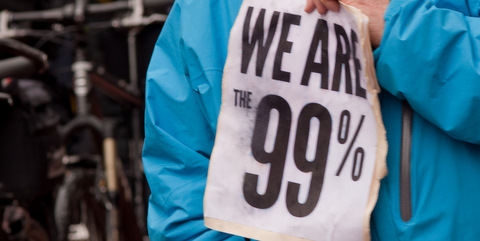
By Jeff Watson. Photography by Brynden McNew
Let’s all take a look at a brief timeline of public support for the members of Occupy Wall Street.
Protesters: “Get corporate interests out of politics!”
Rest Of The Country: “Yeah!”
Protesters: “And lock up the bankers!”
Rest Of The Country: “Yeah! …Wait, what about Molly down at my branch office?”
Protesters: “And let’s get some more environmental legislation on the books!”
Rest Of The Country: “That’s probably worth a conversation, but–”
Protesters: “Death to capitalism!”
Rest Of The Country: “Wait, what?”
Protesters: “We are the ninety-nine percent!”
Rest Of The Country: “Get out of the street, assholes!”
There is a false sense of unity amongst the Occupy movement in this country. A movement that loudly claims its majority opinion is being shouted down by the demonic ‘1%’ doesn’t seem to notice how little of the public is on their side. Their math isn’t the problem: a majority of the wealth in the country really is in the hands of less than 1% of the population, leaving the rest of us, the 99%, to fight over the rest. But if Occupy really is the movement of the 99%, then why does only 33% of the country support them?
Part of it has to do with their constantly expanding list of demands. When adbusters.org, a Canadian based anti-consumerist website, first put out the call to occupy New York City’s Zuccotti Park this past September, their purpose was simple and direct: To convince President Obama to establish a commission to address the influx of corporate money into politics.
This was a noble goal that few Americans could honestly disagree with. It was reasonable. It was timely.
But it didn’t sell papers.

The movement received little press outside of daily financial reports and local news in the northeast. As their numbers grew, though, so too grew the amount of attention directed their way. Styling themselves after pro-Democracy protesters throughout the Middle East, they dug in their heels and tent stakes. Protesters, constantly being asked what they were really interested in by a suspicious public, took an ‘Ask and ye shall receive,’ approach to the question. While leaderless, the movement had several factions that produced separate documents listing grievances and demands.
The newly attentive media took the Occupy Wall Street movement to a national level. Camps sprouted up in major cities from coast to coast. Demands varied from ‘Halt foreclosures for the unemployed, sick, and elderly,’ to ‘Forgive all student loan debt.’ And here is where the math begins to get tricky: While getting money out of politics was still the bedrock of the movement, a push towards accomplishing a laundry list of liberal pet projects made it more difficult for the average American to agree with the movement. A person who believed that too much money was involved in politics at the beginning of the movement could honestly say they supported Occupy. Now that person had to believe in government funding for renewable energy, stricter financial regulation, a progressive tax code, and more to be part of their support base.
Since then, you can ask any protester involved with Occupy what they stand for and get a different answer. Subtle or distinct, the differences from one member to another are real. Unfortunately, this is seen by protesters as one of the strengths of the movement.
“All ideas are welcome,” says Portland sound designer and Occupy Portland protester Gordon Romei. “This is what makes us a movement of the people.” Romei disagrees with the idea that Occupy excludes middle America with its philosophy. “As an American citizen, it’s your movement too.” This is all well, but it speaks to another issue with the Occupy movement: You can’t ask people to stay on message when you refuse to define the message.

The equality of grievances is at the heart of Occupy’s believability problem. When the public is asked to give equal attention to a protester whose home was taken due to a paperwork error at Bank of America, the plight of the debt-laden, degree-wielding unemployed students, and to a protester wearing a Guy Fawkes mask holding a sign that says ‘Corporations Are Killing the Planet,’ Occupy cannot be surprised the public is losing track of their message and growing tired of them.
On one subject, though, protesters are in lockstep: Violence. Romei rightly speaks out against the violence that many mainstream media reports blame on Occupy camps. “The so-called ‘anarchists’ who have been blamed for property destruction do not represent Occupy, and we’ve made this abundantly clear nationwide.” There is a sense of frustration amongst Occupiers who question why there is no credit given for the work they do to prevent violence and crime within their camps.
Even the horrific images of brutality being practiced against protesters have done little to mobilize the public in their favor. Video of silent, peaceful protesters exercising their right to free assembly at UC Davis being callously sprayed with a chemical agent by a campus police officer did not create sympathy for the protesters, only anger with the cowardly officers who practiced this violence. Since the uniformed pushback against protesters has begun in earnest, Occupy’s polling numbers continue to decline.
Occupy takes pride in being a leaderless movement. This pride is misplaced. They claim to be a movement focused on civil and human rights, but they have no Martin Luther King, Jr. They have no Cesar Chavez. They say that this is to keep them powerful, that there is a risk of a leader being assassinated by the One Percent, or being arrested and having the power of the movement diminished. They find strength in their numbers, but that strength is going to tragic waste.
The Occupy movement is powerful, but they have no application for that power. They use it to set up more tents; they use to it to prevent dockworkers from doing their jobs; they use it to energize themselves and no one else. The power they have can change nothing unless they refocus their efforts towards a goal with which more of the country can agree. Right now their only focus is their anger; and their anger has no focus.
In closing, I would like to address any Occupy members who read this.
Occupy has become less a movement of the people and more like a rowdy block party hosted by the students from a Philosophy of Government class at a local community college. Occupy is no longer a movement of the 99%. It is the demon Republicans use to scare their children into investing wisely and voting at every opportunity. It is the whipping boy for anyone stuck in traffic in a major city. It is the most vocal of the most liberal with the most free time.
It is becoming irrelevant. And this cannot be how it ends.
Put your ideals on the line as you have your bodies. Run a candidate for office on an Occupy platform and see if you can get elected with 51%, much less 99%. Cross the party lines and invite the local Tea Party chapter to a sit-in and find out what you can agree needs to change. Stop shouting and start listening if you really want to represent the people. Find the common ground you share with all of America, and don’t stop until you’ve claimed it.
I supported you, and most of America supported you, when your movement was about the welfare of the nation and not the force feeding of a political agenda. Take the bullhorn away from the idiot with the hammer-and-sickle face paint, and maybe we can talk again.
If you don’t, you’ll be nothing more than a joke:
Q: How many Occupy protesters does it take to change a light-bulb?
A: None. They refuse to believe the lights are out.

